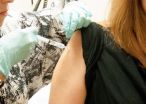Moderate coffee consumption may lower the risk of Alzheimer's disease by up to 20 percent
2014-11-27
(Press-News.org) Drinking 3-5 cups of coffee per day may help to protect against Alzheimer's Disease, according to research highlighted in an Alzheimer Europe session report published by the Institute for Scientific Information on Coffee (ISIC), a not-for-profit organisation devoted to the study and disclosure of science related to coffee and health.
The number of people in Europe aged over 65 is predicted to rise from 15.4% of the population to 22.4% by 20251 and, with an aging population, neurodegenerative diseases such as Alzheimer's Disease are of increasing concern. Alzheimer's Disease affects one person in twenty over the age of 65, amounting to 26 million people world-wide
Recent scientific evidence has consistently linked regular, moderate coffee consumption with a possible reduced risk of developing Alzheimer's Disease. An overview of this research and key findings were presented during a satellite symposium at the 2014 Alzhemier Europe Annual Congress.
The session report from this symposium highlights the role nutrition can play in preserving cognitive function, especially during the preclinical phase of Alzhemier's, before symptoms of dementia occur. The report notes that a Mediterranean diet, consisting of fish, fresh fruit and vegetables, olive oil and red wine, has been associated with a reduced risk for development of Alzheimer's Disease. Research suggests that compounds called polyphenols are responsible for this protective effect, these compounds are also found in high quantities in coffee.
Epidemiological studies have found that regular, life-long moderate coffee consumption is associated with a reduced risk of developing Alzheimer's Disease with the body of evidence suggesting that coffee drinkers can reduce their risk of developing the disease by up to 20%. A recent paper, suggested that moderate coffee consumption was associated with a lower risk of developing dementia over a four year follow-up period, however the effect diminished over longer follow up period.
Finally, the report explores the compounds within coffee, which may be responsible for this protective effect, identifying caffeine and polyphenols as key candidates. Caffeine helps prevent the formation of amyloid plaques and neurofibrulary tangles in the brain - two hallmarks of Alzheimer's Disease. In addition to this, both caffeine and polyphenols reduce inflammation and decrease the deterioration of brain cells - especially in the hippocampus and cortex, areas of the brain involved in memory.
Dr. Arfram Ikram, an assistant professor in neuroepidemiology at Erasmus Medical Centre Rotterdam, presented his findings at the symposium. He commented: "The majority of human epidemiological studies suggest that regular coffee consumption over a lifetime is associated with a reduced risk of developing Alzheimer's Disease, with an optimum protective effect occurring with three to five cups of coffee per day."
Dr. Iva Holmerova, vice chairperson of Alzheimer Europe, commented: "The findings presented in this report are very encouraging and help to develop our understanding of the role nutrition can play in protecting against Alzheimer's Disease. Coffee is a very popular beverage enjoyed by millions of people around the world and I'm pleased to know that moderate, lifelong consumption can have a beneficial effect on the development of Alzheimer's Disease."
The session report details the key scientific research presented by Dr. Neville Vassallo, Dr. Arfan Ikram and Dr. Astrid Nehlig during a session entitled: Nutrition and Cognitive Function, which took place on the 23rd October in Glasgow, UK.
INFORMATION:
For more information on coffee and neurodegenerative diseases, please visit http://www.coffeeandhealth.org.
Please contact us for a copy of the full report.
ELSE PRESS RELEASES FROM THIS DATE:
2014-11-27
Using world-leading research methods, the team of Dr David Wright and Prof Paul Holmes, working with Dr Jacqueline Williams from the Victoria University in Melbourne, studied activity in an area of the brain responsible for controlling movements when healthy participants observed a video showing simple hand movements and simultaneously imagined that they were performing the observed movement.
Using transcranial magnetic stimulation - a technique where a coil placed over the scalp delivers a stimulation to the brain, activates neurons in the underlying area, and causes ...
2014-11-27
TORONTO, Nov. 26, 2014 - Ontario students between Grades 9 and 12 who said they had a traumatic brain injury in their lifetime, also reported drug use rates two to four times higher than peers with no history of TBI, according to research published today in The Journal of Head Trauma Rehabilitation.
"Overall, a teen with a history of TBI is at least twice as likely as a classmate who hasn't suffered a brain injury to drink alcohol, use cannabis or abuse other drugs," said Dr. Michael Cusimano, co-principal investigator of the study and a neurosurgeon at St. Michael's ...
2014-11-27
This news release is available in French.
The world's first clinical trial comparing three alternative treatments for type 1 diabetes was conducted in Montréal by researchers at the IRCM and the University of Montreal, led by endocrinologist Dr. Rémi Rabasa-Lhoret. The study confirms that the external artificial pancreas improves glucose control and reduces the risk of hypoglycemia compared to conventional diabetes treatment. The results, published today in the scientific journal The Lancet Diabetes & Endocrinology, could have a significant impact on the ...
2014-11-27
Leading medical experts today [Thursday 27 November] warn that rising numbers of deaths from liver disease - already the UK's third commonest cause of premature death - will be unavoidable without radical improvements in treatment and detection services, and tougher government policies to control the excessive alcohol use and obesity responsible for much of the national burden of liver disease.
In a major new Lancet Commission, led by Professor Roger Williams, Director of the Institute of Hepatology, London, UK, doctors and medical scientists from across the UK call ...
2014-11-27
Boston, MA. Wednesday, November 26, 2014 -- Researchers from the Broad Institute of MIT and Harvard, Harvard Medical School, and Harvard-affiliated hospitals have uncovered an easily detectable, "pre-malignant" state in the blood that significantly increases the likelihood that an individual will go on to develop blood cancers such as leukemia, lymphoma, or myelodysplastic syndrome. The discovery, which was made independently by two research teams affiliated with the Broad and partner institutions, opens new avenues for research aimed at early detection and prevention of ...
2014-11-27
TORONTO, Nov. 26, 2014--The nervous system may play a bigger role in infections and autoimmune diseases than previously known. If researchers can learn more about that role, it could provide insight into diagnosing and treating everything from the stomach flu to rheumatoid arthritis.
Researchers at St. Michael's Hospital in Toronto, in conjunction with the Feinstein Institute for Medical Research in Manhasset, N.Y., reviewed the latest, most vigorous pre-clinical trials on this topic in a commentary published Wednesday (Nov. 26) in the New England Journal of Medicine. ...
2014-11-27
An experimental vaccine to prevent Ebola virus disease was well-tolerated and produced immune system responses in all 20 healthy adults who received it in a Phase 1 clinical trial conducted by researchers from the National Institutes of Health. The candidate vaccine, which was co-developed by the NIH's National Institute of Allergy and Infectious Diseases (NIAID) and GlaxoSmithKline (GSK), was tested at the NIH Clinical Center in Bethesda, Maryland. The interim results are reported online in advance of print in the New England Journal of Medicine.
"The unprecedented scale ...
2014-11-26
ANN ARBOR--The spaghetti-like internal structure of most plastics makes it hard for them to cast away heat, but a University of Michigan research team has made a plastic blend that does so 10 times better than its conventional counterparts.
Plastics are inexpensive, lightweight and flexible, but because they restrict the flow of heat, their use is limited in technologies like computers, smartphones, cars or airplanes--places that could benefit from their properties but where heat dissipation is important. The new U-M work could lead to light, versatile, metal-replacement ...
2014-11-26
MINNEAPOLIS - The majority of people with dementia have never seen a doctor about their memory and thinking problems, according to a new study published in the November 26, 2014, online issue of Neurology®, the medical journal of the American Academy of Neurology.
In the study, 55 percent of the people with dementia had never had an evaluation of their thinking and memory skills with a doctor.
"These results suggest that approximately 1.8 million Americans over the age of 70 with dementia have never had an evaluation of their cognitive abilities," said study author ...
2014-11-26
ANN ARBOR, Mich. -- Despite clear signs that their memory and thinking abilities have gone downhill, more than half of seniors with these symptoms haven't seen a doctor about them, a new study finds.
University of Michigan researchers and their colleagues say their findings suggest that as many as 1.8 million Americans over the age of 70 with dementia are not evaluated for cognitive symptoms by a medical provider, which in some patients can lead to a failure to uncover modifiable causes of thinking or memory impairment.
The study, published online in Neurology, the ...
LAST 30 PRESS RELEASES:
[Press-News.org] Moderate coffee consumption may lower the risk of Alzheimer's disease by up to 20 percent


